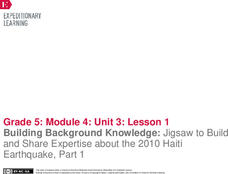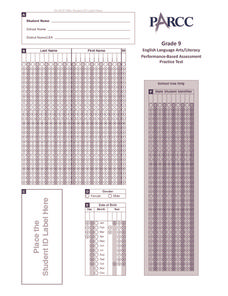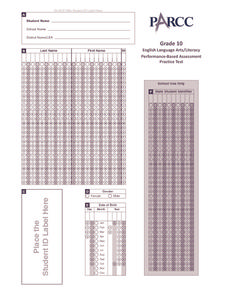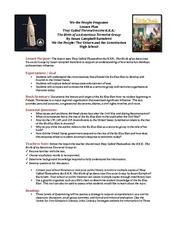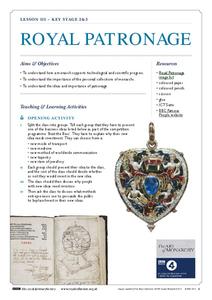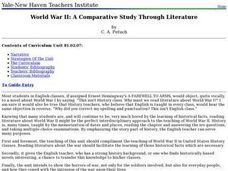EngageNY
Reading the Map and Beginning Chapter 1
Seventh graders begin their study of Linda Sue Park's A Long Walk to Water by discussing scenarios related to the novel with a partner. The discussion topics invite pupils to consider how various factors, such as war and poverty,...
EngageNY
Building Background Knowledge: Jigsaw to Build and Share Expertise about the 2010 Haiti Earthquake, Part 1
Using the Jigsaw protocol, scholars study chunks of text from a speech given by former US presidents following a devastating 2010 earthquake in Haiti. As they read the speech in small groups, they build background knowledge and share...
Curated OER
Performance-Based Assessment Practice Test (Grade 9 ELA/Literacy)
Ready your pupils for Common Core testing by providing them with practice. For this assessment, learners read and respond to a variety of different passages in both multiple-choice and essay format. An online version is also included.
Curated OER
Performance-Based Assessment Practice Test (Grade 10 ELA/Literacy)
Get an idea of how your class members might perform on the Common Core tests with a comprehensive practice test. The assessment includes literary and informational passages for learners to read an analyze. Pupils respond to a series of...
EngageNY
Grade 9 ELA Module 1: Unit 3, Lesson 4
Class members watch the clip of Baz Luhrmann’s Romeo + Juliet in which Benvolio persuades Romeo to go with him to the Capulet ball to see Rosaline. Pairs then examine Act 1, scene 3, lines 64–100, and consider how Shakespeare develops...
University of Pennsylvania
Using Political Postcards to Teach a Revolution of Political Thought
Discuss how political postcards affected everyday people's thoughts and beliefs. Pupils continue a unit on the Dreyfus Affair as they engage in class discussion, watch a video, view a PowerPoint presentation, and fill out worksheets to...
Curated OER
What's In A Name? British Surnames Derived from Places
Students study how British surnames were derived from locations. They observe that some of the more common names are still prevalent today.
Curated OER
General Music: Grades 4 & 5
The story behind the Star Spangled Banner sets off this singing and music lesson. Emergent singers study facts about Francis Scott Key and his famous song, they then discuss and practice singing the first verse paying close attention to...
Curated OER
Studying our Senses
Who would not want an opportunity to taste jellybeans in class? During this investigation, life science learners hold their noses as they take a taste test and find that our perception of flavor is connected with our sense of...
Curated OER
The Called Themselves the K.K.K.; The Birth of an American Terrorist Group
How did Ku Klux Klan develop and flourish in the US? How did the government respond to acts of terrorism conducted by the KKK following the Civil War? How does the government respond to acts of terrorism today? This resource...
Classroom Law Project
Should we believe everything we read? Becoming a discerning consumer of media
Class members investigate the role media should play in a healthy democracy. As part of this study, groups analyze political advertising, use FactCheck to assess not only the veracity of but the persuasions techniques used in candidates'...
Classroom Law Project
What does the Constitution say about voting? Constitutional Amendments and the Electoral College
As part of a study of voting rights in the US, class members examine Constitutional amendments connected with voting and the role of the Electoral College in the election process.
BBC
Royal Patronage
The relationship between European royalty and the artists, scientists, and philosophers they support has been a building block in the artistic and technological progress throughout the world. Learn more about patronage throughout the...
Library of Virginia
An Overview of American Slavery
The final lesson in a unit study of American slavery asks young historians to synthesize what they have learned about how slavery in America changed over time. Revisiting the many documents they have examined, they consider the economic,...
Curriculum Corner
Fairy Tale Unit of Study
What makes a fairy tale a fairy tale? Use a 27-page packet to supplement your next fairy tale unit. With sequencing activities, story map worksheets, character analyses and story elements graphic organizers, and fairy tale highlight...
Curriculum Project
Hotel Rwanda: Comprehension and Discussion Activities for the Movie
Support your presentation of the film Hotel Rwanda with this collection of worksheets, which includes background information, vocabulary, summary of characters, and fill-in-the-blank worksheets for students to complete as they watch the...
Constitutional Rights Foundation
The Declaration of Independence
Your class can write a PSA about the Declaration of Independence! They write public service announcements and present them to the class. They also engage in reading and discussion activities to further understand a challenging—yet...
PBS
Explicit and Implicit Language – Interpreting the Meaning of the Fourteenth Amendment
How do Supreme Court justices interpret amendments to the Constitution? The resource helps answer that question by discussing how people use explicit and implicit language to interpret the meaning of the Fourteenth Amendment. Learners...
Curated OER
Scientists Study Dinosaur "Mummy"
Students share ideas about how scientists know about dinosaurs, then read a news article about the recently found remains of a hadrosaur. In this dinosaur lesson plan, the teacher introduces the article with a class discussion and...
Curated OER
A Separate Peace: Chapter 13 Reading And Study Guide
In this comprehension check worksheet, students define 3 vocabulary words, define 1 literary term, and respond to 6 short answer questions pertaining to chapter 13 of A Separate Peace by John Knowlesin order to help them better...
Curated OER
A Separate Peace: Chapter 12 Reading And Study Guide
In this comprehension check worksheet, students define 4 vocabulary words, define 1 literary term, and respond to 8 short answer questions pertaining to chapter 12 of A Separate Peace by John Knowles in order to help them better...
Curated OER
World War II: A Compartive Study through Literature
Students examine World War II through the use of literature. As a class, they brainstorm a list of words they relate to the war itself. In groups, they read various novels and view photographs showing the experiences of the Jews,...
Curated OER
Getting to Know Austria- Map Skills
In this Austria map skills learning exercise, students apply map skills to answer 14 fill in the blank questions about the country. They determine border countries, identify regions, find the capitol, and name rivers. They draw a map of...
Curated OER
Optics - The Study of Light
In this optics worksheet, students read about how light can reflect or refract and how lenses and mirrors work. Then students complete 13 matching, 27 fill in the blank, and 8 word problems.
Other popular searches
- Word Study Activities
- Word Study and Fluency
- Word Study Games
- Word Study Lesson Plans
- Word Study Lessons
- Solar System Word Study
- Esl Word Study
- Word Study Second Grade
- Word Study For
- Vocabulary Word Study
- Phonics/word Study
- Old Word Study



